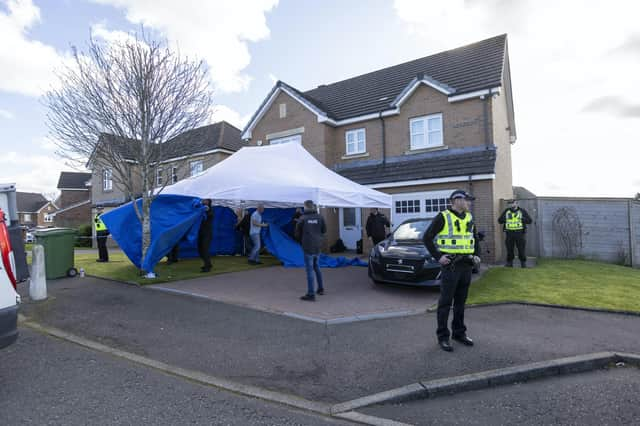Owen Polley: At last some good news for the Union, as the Scottish nationalists implode


Recently, though, the stories coming out of Scotland have been as heartening as they’ve been entertaining. Just months ago, the Scottish National Party (SNP) seemed untouchable and most commentators assumed it would dominate Scots politics for the foreseeable future. Then Nicola Sturgeon resigned, her husband was arrested and the SNP began to implode, as a litany of tawdry revelations and accusations were revealed.
The nationalists, of course, have long demanded a second referendum on Scottish independence, but Westminster said no, arguing that voters made their decision clear in 2014. The SNP, though, collected over £600,000 in donations to finance a separatist campaign, and the police are now investigating how it spent that money.
Advertisement
Hide AdAdvertisement
Hide AdAs part of this inquiry, Sturgeon’s husband, Peter Murrell, who was formerly chief executive of the SNP, was detained at the start of April and, more recently, officers arrested the party’s treasurer, Colin Beattie, who promptly resigned.
Both were released without charge, but the nationalists’ popularity ratings are collapsing, their new leader, Humza Yousaf, is the punchline to numerous jokes and the case for Scottish separatism is unravelling.
It’s scarcely believable for those of us who watched, aghast, as the SNP escaped punishment by voters as its ministers presided over spiralling drug deaths, Covid disaster in care homes, crisis in Scotland’s once proud education system and a procurement scandal over ferries.
Things only began to unravel seriously in January when the SNP introduced a law, intended to permit anyone over 16 to change gender without a medical diagnosis. The Scottish secretary of state, Alister Jack, struck down Sturgeon’s Gender Recognition Bill, using his powers under Section 35 of the Scotland Act. This was a courageous decision by the government, which had previously been reluctant to check the excesses of devolved administrations.
Advertisement
Hide AdAdvertisement
Hide AdToo often, Westminster took the view that granting further powers to the regions, and avoiding intervening in their politics, could restrain separatism and disarm nationalist parties. On this occasion, though, it decided that the SNP mustn’t be allowed to pass its bill, because that decision would affect the whole UK. It looked, for a time, like Sturgeon would successfully turn the row into another grievance against London. Instead, it became an even greater fiasco for the SNP, when it was reported that a rapist, who claimed to be a ‘trans woman’, had been admitted to an all-women's prison in Stirling.
These incidents may have prompted Sturgeon’s decision to resign as first minister. Or, as some people suggested, she might have been aware that the police were about to arrest key figures in her party (including her husband). Some opponents even claimed that the arrests were delayed until after the party’s leadership contest, so that Sturgeon’s preferred candidate (Yousaf) would win.
It is certainly likely that SNP members would have voted differently, if they’d known what was going to ensue. In the first weeks of Mr Yousaf’s spell as first minister, the police removed items from his mentor’s home and erected an evidence tent in her garden.
A luxury campervan, intended as an SNP ‘battle-bus’, but never used, was seized from Sturgeon’s 92-year-old mother-in-law’s driveway. And throughout this media circus, Yousaf continued to defend his former colleagues, and issue unguarded comments to journalists, that seemed only to make things worse. It’s not likely, either, that this period of turbulence for the SNP is close to being over. The police are expected to announce the outcome of their investigation soon and there may be more arrests or charges.
Advertisement
Hide AdAdvertisement
Hide AdMeanwhile, the party has been scouring Scotland, sending increasingly desperate emails, as it searches for an accountancy firm that is willing to audit its accounts. If it cannot get them signed off by the 31st May, its financial woes will deepen and it may even miss out on over £1 million of ‘short money’, to which opposition parties at Westminster are entitled.
Nicola Sturgeon has described the crisis as her ‘worst nightmare’. But, after the years she spent lacerating political opponents and attempting to destroy the United Kingdom, by any possible democratic means, she will gain limited sympathy from unionists. The SNP’s problems will not, of course, end the campaign for Scottish independence. The party, though, was unusually successful at reaching out beyond a core of separatist fanatics, building a coalition that included disenchanted young people, environmentalists and the advocates of various ‘progressive’ causes, among others.
It was so dominant in recent years, that the SNP may even remain Scotland’s biggest party for some time, but it will struggle to regain momentum and unionist voters are likely to vote tactically, in order to maximise its losses. It was telling that, when Yousaf delivered a recent speech setting out his priorities as leader, it was scarcely reported, as the media and public concentrated instead on the SNP’s implosion. During its time at the helm at Holyrood, the party has acted arrogantly and flouted the boundaries between providing government and campaigning to destroy the UK. There are welcome signs that ministers at Westminster are finally beginning to push back against these abuses of power.
The moral for national politicians is that a firm line against separatism in the UK is likely to be more successful, in the long-term, than pandering to nationalists.